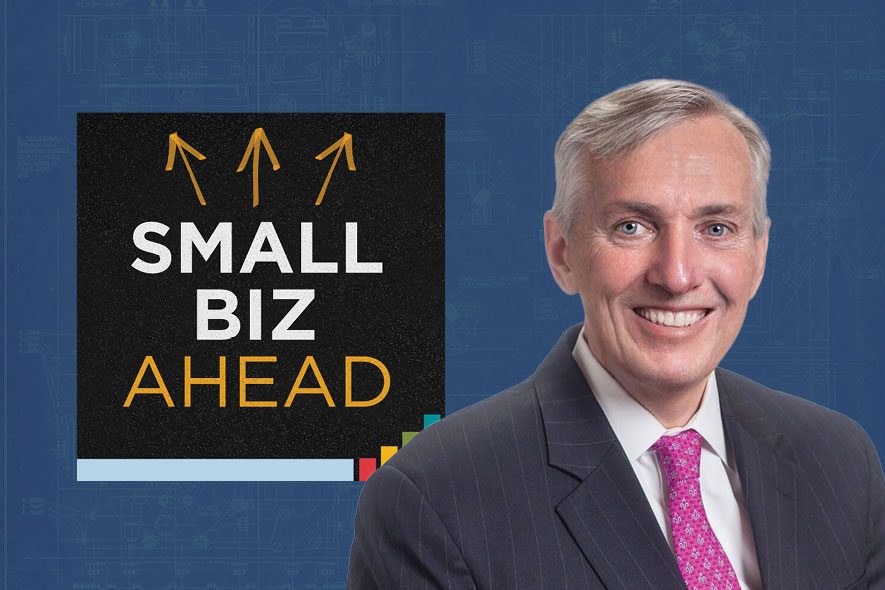Transcript
The views and opinions expressed on this podcast are for informational purposes only, and solely those of the podcast participants, contributors, and guests, and do not constitute an endorsement by or necessarily represent the views of The Hartford or its affiliates.
You’re listening to the Small Biz Ahead podcast, brought to you by The Hartford.
Our Sponsor
This podcast is brought to you by The Hartford. When the unexpected strikes, The Hartford strikes back for over 1 million small business customers with property, liability, and workers compensation insurance. Check out The Hartford’s small business insurance at TheHartford.com.
Gene (00:02):
Hey everybody, this is Gene Marks and welcome back to this week’s Small Biz Ahead podcast. Thank you so much for joining me. Let’s talk about hiring salespeople. Now, this is a conversation about compensating salespeople. So, there’s a lot of things to consider when you’re bringing on a new salesperson, the kind of agreements you should have or what to look for, all that kind of stuff. But I wanna talk about compensating salespeople and maybe I’ll dig into some of those other topics sometime in the future. So, what do you pay your salespeople? How do you compensate them? There was a recent report earlier this year actually, from Payscale. They’re like a research compensation firm that found that three out of 10 of the most recession proof jobs in this country are related to sales.
Gene (00:48):
And that kind of makes sense to me, and I think it probably makes sense to you. I mean, if the economy slows down or when there’s ever a slowdown in an economy, I mean, people tend to cut overhead. But you and I, we really do not want to get rid of our salespeople, because those are the people that generate revenues for our business. So it’s really, really important. So the question is like, what do you pay ’em? How do you pay fairly? So let me give you some thoughts on paying your salespeople. Okay? For starters, you really have to determine whether or not your compensation is gonna be salary or commission, or both salary and commission. Now, I can tell you that most jobs nowadays do not have, they’re not all commission unless they are something like a part-time thing, or you’re, you’re working with like an independent sales rep.
Gene (01:38):
Most of the time, if you’re bringing on an employee, there’s like a salary plus a commission involved. Now, the commission itself, can be based on many different things, but you have to weigh it with salary. And it kind of depends on where you’re located, but more importantly, what industry you’re in as well, what kind of business that you’re in. I mean, for example, if you’re in a business that has a long sales process, say you’re selling like heavy equipment or machines or airplanes or something like that, generally those companies pay a higher salary and then a commission or a bonus when the sale is actually completed, because you can’t really push people into closing sales when it’s a real big ticket item. These things take a longer process. So if that’s the nature of your business, you’re really gonna be leaning more towards a higher salary and a lower commission on the end when the sale is completed.
Gene (02:36):
Now, if your business is more transactional based, say you’re a retail store, or say you’re… people are going out selling landscaping services or roofing equipment or HVAC systems, like heating and air conditioning systems and you’re giving that leads and those people are doing that, they’re making one or two sales a week or a certain number of sales every day, those tend to be the sales jobs that get higher commissions and a lower salary. Does that make sense? So you wanna balance it based on that. You have to determine that for your business. By the way, regardless of how you’re paying commission and salary, you do wanna give your sales people like a shot to get up to the game. I mean, if you’re hiring somebody that’s not very experienced, maybe you want to give them two or three months of you’re giving them a commission, even if they’re not making the sales.
Gene (03:26):
So they can at least maintain their sort of standard of living and pay their bills while they get up to speed. But as long as you have a clear timeline saying, listen, we’re gonna give you commission for the first three months… minimum commission, but then after that, you gotta perform, that’s fine, as long as your salespeople know that in advance. So, balance salary versus commission, that’s number one. Number two, do you pay based on revenue or do you pay based on gross profit? Now, revenue is your top line sale. Gross profit means your sales less your direct costs. That gets you to gross profit. So which do you pay on. Some businesses like to pay on gross profit because it, it incentivizes those sales people to sell stuff that are most profitable, and that’s fair enough.
Gene (04:13):
Honestly though, most of my clients, most of the companies that I work with, they tend to pay their salespeople based on the top line, based on revenue. Why is that? Well, first of all, it’s easier to calculate, so you don’t have to get into a whole rigamarole of accounting to figure out what your actual gross profit is on a product. Secondly, I mean, most of my clients don’t like to really share what their profits are on a sales. So they would rather pay on that top line, and that way they, they can just disclose that much less, you know? So for a salesperson, I don’t think it really makes a difference. I think as long as they’re getting a fair commission, whether it’s top line or gross profit, they’re gonna be happy with it…
Gene (04:50):
Moving on. Also when it comes to paying salespeople, don’t leave out all the other people that are in the sales process. I mean, you might have an outside salesperson knocking on doors. You might have an inside salesperson that’s making phone calls after or before that salesperson knocks on the door. You might have an internal customer service rep who makes sure that even when a sale is made, it gets closed and then delivered. You might have an intern that’s making cold calls, you’re setting up appointments. My best clients, they compensate everybody in that process. They make sure that everybody that’s part of the game, they get a little piece of the action when a sale closes. Maybe it’s 25 bucks on a sale or something like that. Believe it or not, the amount is not as important as just the thought of doing that and giving people that incentive to make that extra money.
Gene (05:40):
Finally, when you’re compensating your sales people, you’ve gotta be giving constant feedback and getting feedback from them. You should have some knowledge performance indicators, KPIs. You should be giving them the metrics that they know what their sales goals should be. And how many they should be closing, every week or every month. And then you should be talking about it with ’em. That’s part of the compensation plan is giving them that feedback and then adjusting what that compensation is. I mean, it gives them the incentive if they know they’re on the right track or you give ’em good advice, they can close more sales and get more money in their pockets. So let me recap. You first wanna determine whether or not you’re gonna pay salary or commission, or a combination of both.
Gene (06:24):
It’s gonna be most likely a combination of both. It depends on your industry, okay? You also wanted decide whether you’re gonna pay on based on revenue, the top line or gross profit. Most of my clients pay on the top line revenue. You wanna make sure that everybody in the sales process is being incentivized. That’s from the intern. That’s maybe booking an appointment all the way up to the salesperson who’s there closing the deal. And finally, you want to give constant feedback and have quantifiable deliverables and metrics so that your salespeople can track what they’re doing and what they’re earning, because that’ll help them to earn that much more. In the end, though, I do have to say, you can come up with this great sales plan. My best clients, they talk about their best salespeople and the best salespeople no matter what you pay them…
Gene (07:07):
They have that sort of innate thing that they just wanna, they have that drive to do better. That’s the kind of people that they are, so compensation is not everything. It really, comes down to the person. So even after you come up with this good salary and compensation structure, making sure people are getting paid, making sure you’re doing the evaluations, you gotta be kind of tough about whether or not that salesperson is gonna make it with you long term. And if they’re not making the minimums, even with a generous compensation structure, that should be your sign that person might not be right for your business and maybe move on and find somebody else. You’ll always find good salespeople out there, particularly if you pay them well. A good salesperson, they’re kind of greedy like me.
Gene (07:45):
They wanna make money. So if you wanna make money too, you’ll pay them fairly. You can always find those good salespeople. My name is Gene Marks, and you have been listening to The Hartford Small Biz Ahead podcast. If you need any further advice or tips or help in running your business, please visit us at SmallBizAhead.com or SBA.TheHartford.com. I want to thank you for listening. Hope you got some good value for these thoughts of mine on paying your salespeople. I’ll be back to you next week with another segment, another podcast to help you run your business. We’ll talk to you then. Take care.
Download Our Free eBooks
- Ultimate Guide to Business Credit Cards: The Small Business Owner’s Handbook
- How to Keep Customers Coming Back for More—Customer Retention Strategies
- How to Safeguard Your Small Business From Data Breaches
- 21 Days to Be a More Productive Small Business Owner
- Opportunity Knocks: How to Find—and Pursue—a Business Idea That’s Right for You
- 99 New Small Business Ideas





